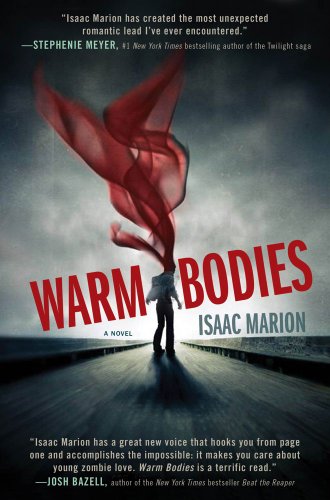
I normally detest zombie books.
Yeah, part of it is that they're scary and often gory as well. But more than that, I'm just not particularly interested in this brand of the undead. In most of these stories, zombies appear in either a global apocalypse or a small-town nightmare, wander around and moan, eat a few brains, and then are either repelled by a small, desperate group of survivors or triumph, and wander the undead earth forevermore, longing for more brains.
I picked up
"Warm Bodies" by Isaac Marion because a coworker said it was her favorite book. She described to me the humor, the insight, the sentiment behind it and then actually let me borrow her loaner copy. Yup, she has a loner copy. That's how much she likes this book. So I read it. And I'll admit, I was skeptical at the beginning. I'd heard about the movie version of this, and had it branded as a sort of zombie "Twilight," teen romance meets necrophilia. While this novel hasn't made me want to go out and play HvZ, it took me by surprise and has challenged some of the assumptions I made about the zombie concept in general.
First of all, this book is hilarious. It's written from the perspective of R, a zombie. When you fall victim to the plague, which everyone does unless someone is good enough to destroy their brain on death, you forget everything. Your name, your memories, even how to read. R begins the story by describing how deeply unsatisfying his (un)existence as a zombie is, wandering around the airport that is the hub of zombie activity in the area. When they get hungry, they go into the city in hunting parties to find and devour human refugees from the huge, reinforced stadium that has become humanity's last bastion of the living. R is profoundly unimpressed with his own existence. He's not content to just moan and shamble any more. So he tries getting married, but even that is a hollow mockery of the meaning he's really looking for.
Then he meets Julie. Or rather, he eats Perry. When he consumes the brain of Julie's boyfriend on an ill-fated (for the humans) salvage trip, R falls completely in love with Julie. The problem? He doesn't know quite what that means or feels like any more. So he kidnaps her, disguises her as a zombie and keeps her with him at the airport for a while. During that time they get to know one another a little bit better, and R finds that parts of Perry's personality are integrating themselves into him. The resulting story is one of the struggle against hopelessness, towards acceptance and the desire to make the world a better place for everyone. It's also a retelling of Romeo and Juliet, which made for some interesting "aha!" moments.
While the story was entertaining, it wasn't particularly inspired. The hypothesized source of the zombie plague, discussed by Julie toward the end of the book, is pretty trite. But it fits in well with the rest of the book. Similarly, the apparent solution and cure for the plague is equally unimaginative and too sappy for me. What actually made this book a great read was R and his introspection. He's honest and matter-of-fact about his own presence and its influence on others, as well as his perceptions of the lackluster (un)life he's (un)living. He discusses the sick parodies of life that take place around him, including zombie sex, which he compares with slapping two dead chickens together. R's connection to Julie both confuses and galvanizes him, leading him to grasp toward more and reject the notion that he will spend eternity as just another one of the shambling masses.
One of my favorite aspects of R was the fact that he challenged the binary concept of life and death. He's (un)dead, but still retains enough of himself to question the point of his semi-existence and wonder after more meaning. Perry, on the other hand, was still physically alive but had lost the will to live or the ability to keep hoping for salvation, for humanity's victory. They make an interesting pair, and Julie's hopefulness is a beacon for R's returning humanity as well as a wake-up call to Perry about what he gave up.
Read this novel if, like me, you're a zombie skeptic. It's got humor, insight, and refreshingly real characters who will make you consider what humanity means, what we need and where we're going. It's been around for a while, so odds are good that you can find a copy of "Warm Bodies" today at your favorite local, independent bookstore.



